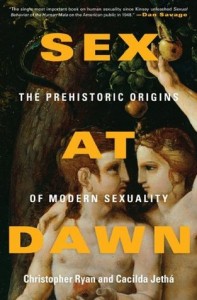 **This review contains adult language and discusses sex and sexuality in frank terms. You know, in case my review of The Mistress Contract didn’t weird you out enough.**
**This review contains adult language and discusses sex and sexuality in frank terms. You know, in case my review of The Mistress Contract didn’t weird you out enough.**
A little over a year ago I confessed to my obsession with books about sex.
This doesn’t mean that I read a lot of what my mother-in-law calls “bodice rippers”; rather, I read books with titles like Why Women Have Sex: Sexual Motivation, from Adventure to Revenge and Virginity Lost: An Intimate Portrait of First Sexual Experiences.
Whether my enjoyment of these subject is a symptom of nymphomania, a result of being raised by a single mother, or my subconscious way of coping with exhibitionism, I shall leave to Freud to untangle. But I think it may have something to do with Texas’ crappy sex ed programs (and my subsequent lack of education) as well as a general love of psychology.
I like knowing what makes people tick. Why do people behave and think the way they do? What kind of lives did our prehistoric ancestors live, and how could their evolution affect our own? Why do so many of us listen to the “lizard part” of our brains? And can we ever escape the paths that history has made for us?
These are the questions that Sex at Dawn: The Prehistoric Origins of Modern Sexuality (and a zillion other books and studies) endeavors to answer.
A bit of background
There’s a whole psychological niche dedicated to trying to understand why humans are the way we are, and why our sexual behavior is the way it is. If you haven’t heard of “evolutionary psychology,” here’s a quick summary.
Essentially, EP states that prehistoric males and females used two different mating strategies:
- Females looked for a mate who was strong and healthy and could protect and care for her and her offspring. Females wanted a male who would dedicate his resources (time, energy, food, etc.) to her and her offspring alone.
- Males were looking to reproduce as often as possible. They wanted as many healthy female mates as they could get, and wanted to prevent those mates reproducing with other males, in order to avoid the risk of dedicating their time and resources to offspring who were not theirs.
Evolutionary psychologists claim that these mating strategies have passed on through the generations — which explains why (most) men are promiscuous (meaning they have sex with multiple women) and why (most) women prefer monogamy.
Are you sensing the problems with this theory? If evolutionary scholars are correct, the average man is nothing but a horny opportunist and the average woman is willing to whore out her body in exchange for male protection.
Evolutionary psychology, according to the authors of Sex at Dawn, reduces our ancestors—and us—to nothing more than conniving, cheating, slutty creatures.
At the same time, society (and scientists) are telling us that monogamy is the “natural” choice for humans. If that’s true, why is the divorce rate hovering at around 50%? If monogamy is the natural state of human existence, why are we so bad at it?
You have to wonder: if men and women evolved together in sexually monogamous couples for millions of years, how did we end up being so incompatible? It’s as if we’ve been sitting down to dinner together, millennium after millennium, but half of us can’t help wolfing down everything in a few frantic, sloppy minutes, while the other half are still setting the table and lighting candles.
Sex at Dawn
Authors Christopher Ryan and Cacilda Jethá wrote Sex at Dawn as both a history of human sexuality and a counter-argument for evolutionary psychology.
Instead of seeing ancient human’s lives as “solitary, poor, nasty, brutish, and short,” the authors present evidence that “human beings evolved in egalitarian groups that shared food, child care, and often, sexual partners.” Like many scientists and psychologists, the authors use humanity’s closest relatives—chimps, bonobos, and the more-like-cousins-by-marriage gibbons—as living models of ancestral human behavior — and what they find indicates that humans should be anything but monogamous.
With any other question we have about the origin of human behavior, we look to chimps and bonobos for important clues: language, tool use, political alliances, war, reconciliation, altruism…but when it comes to sex, we prudishly turn away from these models to the distantly related, antisocial, low-I.Q. but monogamous gibbon? Really?
The turning point
In fact, the authors claim that it wasn’t until the advent of agriculture that paternity even mattered. After all, hunter-gatherer societies of Africa and South America care little about paternity, preferring to raise children as a group.
The most important pivot point in the story of our species, the shift to agriculture redirected the trajectory of of human life more fundamentally than the control of fire, the Magna Carta, the printing press, the steam engine, nuclear fission, or anything else has or, perhaps, ever will. With agriculture, virtually everything changed: the nature of status and power, social and family structures, how humans interacted with the natural world, the gods they worshiped, the likelihood and nature of warfare between groups, quality of life, longevity, and certainly, the rules governing sexuality…Because of private property, for the first time in the history of our species, paternity became a crucial concern.
Is monogamy really natural?
According to Ryan and Jethá, no. So why the push for it? Is our obsession with monogamy a social construct, maybe a result of religion’s powerful hold over many facets of our lives?
If the independent, isolated nuclear family unit is, in fact, the structure into which human beings most naturally configure themselves, why do contemporary societies and religions find it necessary to prop it up with tax breaks and supportive legislation while fiercely defending it from same-sex couples and other proposing to marry in supposedly “nontraditional” ways? One wonders, in fact, why marriage is a legal issue at all — apart from its relevance to immigration and property laws. Why would something so integral to human nature require such vigilant protection?
Similarly, why do we assume that mothers and fathers can love multiple children, but not multiple partners? Why do modern humans force ourselves into nuclear family units despite historical and evolutionary evidence that doing so weakens community bonds, causes conflict, and leads to less healthy children?
First-born children often feel jealous when a younger sibling is born. Wise parents make a special point of reassuring the child that she’ll always be special, that the baby doesn’t represent any kind of threat to her status, and that there’s plenty of love for everyone. Why is it so easy to believe that a mother’s love isn’t a zero-sum proposition, but that sexual love is a finite resource? Evolutionary biologist Richard Dawkins asks the pertinent question with characteristic elegance: ‘Is it so very obvious that you can’t love more than one person? We seem to manage it with parental love…love of books, of food, of wine…love of composers, poets, holiday beaches, friends…why is erotic love the one exception that everybody instantly acknowledges without even thinking about it?’
And your point…?
I know you’re thinking the same thing I was throughout most of my reading of Sex at Dawn: Yea, this evidence certainly makes some sense. But what are we supposed to do about it?
If the authors’ theories are correct, it means that humans would be happier and healthier if we weren’t monogamous. It also, at least to me personally, feels like the authors are saying it’s natural to want multiple partners — the implication being that if you don’t, there’s something wrong with you.
According to my reading, the authors of Sex at Dawn suggest a couple of ways we as humans should alter our behavior to one, be more in line with our evolution, and two, make everyone feel a lot less pressure to be monogamous:
- Take sex less seriously – We punish and regulate sex like it’s a foreign element in our lives, when really it’s more like breathing or eating or sleeping. A relaxation of social codes to make sexual satisfaction more accessible would make everyone, essentially, chill the fuck out about it.
- Stop insisting on monogamy as the ideal – Sexual fidelity is “highly unrealistic,” and shoehorning people into trying to live that way causes stress and unhappy relationships.
- Marriage does not equal unending sexy times – There’s a certain amount of cooling of the romantic fires throughout a long relationship. Expecting the 500th time to be as thrilling as the first is dangerous.
- Communicate! Couples need to discuss their feelings and desires, and find a balance that works for them.
- Recognize that “non-traditional” families are still families – Whether it’s two moms, two dads, two dads and a mom, or several families living together, the important thing is each family member’s love for the others.
I’m not sure how I feel about all these ideas. I do know that I am in no way interested in being anything but monogamous, and evolution can just deal with it. I also dislike that the authors of Sex at Dawn, in an attempt to argue against evolutionary psychology, have fallen into the same trap as the people with whom they disagree: classifying human behavior solely on what was, without truly acknowledging the incredible variety that is human sexuality.






